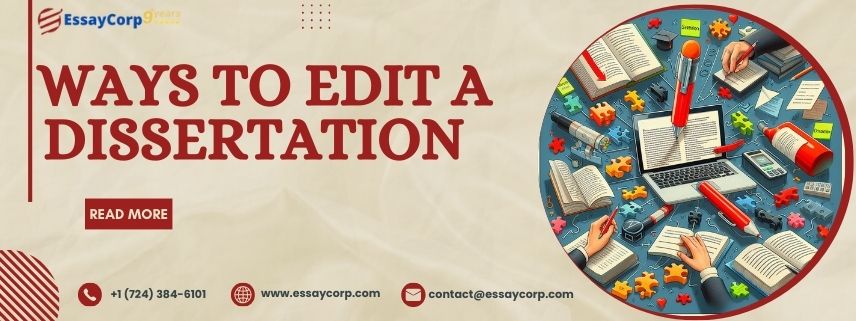Writing a dissertation is a huge task that requires a lot of effort, dedication, and attention to detail. After months or years of research, writing, and revising, you may feel a sense of relief upon completing the first draft. The process is still ongoing, and editing your dissertation can have a significant impact on its quality. This is a chance to refine your ideas, strengthen your arguments, and ensure that your dissertation meets the highest academic standards.
To edit a dissertation, you must thoroughly and critically review your written work, identifying and correcting errors, improving clarity, and improving the overall quality of your document. It included various aspects, including checking for grammar, spelling, and punctuation mistakes, ensuring logical flow and substance, verifying the accuracy of your information and citations, and improving the overall structure and organization of your content.
What is a Dissertation?
A dissertation is a strong piece of original research and writing that represents the culmination of a master's student's years of study. It is a book-length scholarly work, typically ranging from 100 to 300 pages, that fully examines a specific research question or hypothesis through the use of tough technique. A dissertation is defined as having new and original research from master's candidates that adds significantly to the body of knowledge in the field of study.
This original research could take the form of experiments, data analysis, archival investigation, field studies, or other modes of inquiry appropriate to the discipline. The dissertation process requires the highest level of subject matter expertise, critical thinking abilities, perseverance, and time management skills. After thoroughly researching the topic and composing the multi-chapter written work, the candidate must defend their dissertation before a committee of faculty experts. This intense public defense allows the committee to examine the dissertation's validity, significance, and scholarly value. Successfully completing this capstone project and having it approved is the final requirement for earning a master's degree and the highest academic credential in one's field of study.
Effective ways and techniques for editing a dissertation
Ways to Edit a Dissertation
- Take a Break: After spending countless hours immersed in your research and writing, it's essential to take a step back and gain some distance from your work. This break will allow you to return to your dissertation with a fresh perspective, enabling you to identify areas that need improvement more effectively. Even a short break of a few days can help you approach your work with renewed focus and objectivity.
- Read Out Loud: Reading your dissertation out loud can be an invaluable editing technique. By engaging your auditory senses, you may catch awkward phrasing, overlap, or disagreement that you might have missed while reading silently. This method can also help you identify areas where your writing lacks clarity or flow. Reading aloud allows you to hear how your words and sentences sound, which can reveal areas that need polishing or restructuring.
- Use Editing Tools: Utilize editing tools and resources to help you in the editing process. Grammar checkers, style guides, and online writing resources can help you identify and correct common errors, ensuring that your writing adheres to academic conventions and standards. Tools like Grammarly, Hemingway Editor, and the Purdue Online Writing Lab (OWL) can be invaluable resources for improving your writing.
- Focus on Structure and Organization: Examine the overall structure and organization of your dissertation. Ensure that your ideas are presented in a logical and sensible manner and that your arguments flow smoothly from one section to the next. Consider restructuring or redeveloping sections if necessary to improve the clarity and readability of your work. A well-organized dissertation not only helps your readers follow your line of thought but also demonstrates your ability to present complex ideas in a clear and structured manner.
- Check for consistency: Consistency is key in academic writing. Review your dissertation to ensure that you have consistently used the same terminology, citation style, formatting, and tone throughout the document. Differences can harm the professional appearance and credibility of your work. Establish a style guide early on and refer to it consistently throughout the editing process.
- Look for Feedback: Don't underestimate the value of asking for feedback from others. Share your dissertation with your supervisor, colleagues, or a writing center for their input and suggestions. Fresh eyes can often identify areas for improvement that you may have overlooked, and their feedback can provide valuable insights for strengthening your work. Be open to constructive criticism and use it to improve your dissertation further.
- Verify References and Citations: Accurate and complete references and citations are essential in academic writing. Carefully review all your in-text citations and reference list to ensure that they are correctly formatted and consistent with the required citation style. Double-check that all sources cited in the text are included in the reference list and vice versa. Incorrect or incomplete citations can weaken the credibility of your work and potentially lead to charges of academic misconduct.
- Proofread: Proofreading is a critical step in the editing process. Carefully review your dissertation multiple times, focusing on different aspects such as spelling, grammar, punctuation, and formatting. Consider printing out a hard copy, as it can be easier to catch errors on paper than on a screen. Proofreading should be done in multiple rounds, as it's easy to miss errors on the first or second pass.
- Customize for Your Audience: Keep your target audience in mind throughout the editing process. Tailor your language, tone, and level of detail to ensure that your dissertation inspires your intended readers, whether they are members of your dissertation committee, scholars in your field, or a broader academic audience. Use proper academic language and avoid slang or overly technical terminology that may confuse or separate your readers.
- Look for Professional Editing Services: If you have the resources, consider looking for professional editing services like Essaycorp. While these services can be costly, they can provide a valuable extra layer of review and ensure that your dissertation meets the highest standards of quality and professionalism. Professional editors are trained to identify and correct errors that you may have overlooked, and they can offer suggestions for improving the overall clarity and flow of your writing.
- Address Feedback and revision: After receiving feedback from your supervisor, colleagues, or professional editors, take the time to carefully address their comments and suggestions. Revise your dissertation accordingly, making sure to incorporate their feedback in a thoughtful and judicious manner. Remember, your dissertation is a reflection of your academic expertise, so it's essential to ensure that it meets the highest standards.
FAQs
Q: Why is editing so important?
A: It ensures your dissertation is well-written, well-organized, and free of errors, allowing your original ideas and contributions to shine through clearly.
Q: How many editing passes?
A: At least 3–4 full passes, each focused on different elements like structure, clarity, citations, and formatting.
Q: Edit myself or hire a pro?
A: Do self-editing first, but consider a professional edit for valuable objectivity and expertise.
Q: What should I look for when editing?
A: Organization, flow, voice consistency, accurate citations, grammar/spelling, wordiness, adherence to guidelines.
Q: How to stay focused editing?
A: Take breaks, use tools, set goals, have others proofread sections, and celebrate milestones.
Q: When is it really done?
A: When it meets all requirements and you have full confidence in the quality.



